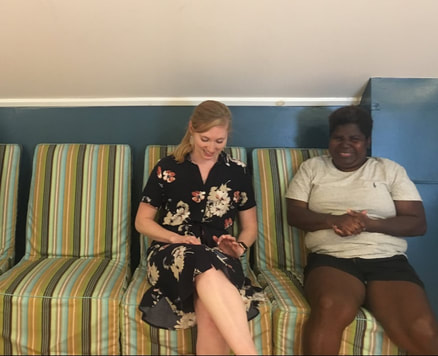Mentorship & the Individualized Plan
"I stand on the sacrifices of a million women before me thinking what can I do to make the mountain taller so that the women after me can see farther. . . "
-Rupi Kaur
-Rupi Kaur
The mentor/mentee relationship is a key aspect of the R.E.A.C.H. program and is intended to create a bond lasting beyond the twenty week session. The mentor and mentee will work together to help the mentee identify and obtain her goals.

The mentor acts as a grounding rock for the mentee as she travels her path. The mentor offers support and guidance for the mentee, passing down real-world knowledge, which has been accumulated through personal and professional experiences. Mentors leverage their contacts to assist mentees as appropriate as well as assisting mentees in navigating systems such as financial aid, SNAP, or financial institutions, by making the appropriate referrals and helping mentees to advocate for themselves. R.E.A.C.H.’s empowerment model, thus, fosters participants’ confidence and independence, while creating access to community connections and support.
Potential participants can contact us directly or else be referred by one of the local organizations we work with (see main page). Once a referral has been made, participants have a thirty-minute intake meeting with facilitators, after which, if accepted, participants will be assigned a mentor. Mentors then schedule a preliminary meeting with mentees during which the mentee will outline her goals and objectives to the mentor and the two will set about making a plan for the achievement of those goals.
With the support of her mentor, each participant will create a plan that will have clearly stated goals. Along with each goal listed, participants will also identify micro-goals that are important steps along the pathway to her success. Additional to the goals and micro-goals, potential obstacles are identified that may arise, and an action plan is created to address those obstacles.
By practicing the skills necessary to adapt to real-life conditions while remaining in pursuit of their goals, participants are able to build confidence and empower themselves, while still having access to the support of a mentor and the group at large.
As participants begin achieving their micro-goals mentors and mentees celebrate and acknowledge those successes and, at the appropriate time, begin talking about goal expansion and looking towards the future.
Potential participants can contact us directly or else be referred by one of the local organizations we work with (see main page). Once a referral has been made, participants have a thirty-minute intake meeting with facilitators, after which, if accepted, participants will be assigned a mentor. Mentors then schedule a preliminary meeting with mentees during which the mentee will outline her goals and objectives to the mentor and the two will set about making a plan for the achievement of those goals.
With the support of her mentor, each participant will create a plan that will have clearly stated goals. Along with each goal listed, participants will also identify micro-goals that are important steps along the pathway to her success. Additional to the goals and micro-goals, potential obstacles are identified that may arise, and an action plan is created to address those obstacles.
By practicing the skills necessary to adapt to real-life conditions while remaining in pursuit of their goals, participants are able to build confidence and empower themselves, while still having access to the support of a mentor and the group at large.
As participants begin achieving their micro-goals mentors and mentees celebrate and acknowledge those successes and, at the appropriate time, begin talking about goal expansion and looking towards the future.
Sisters for Peace
413-205-6442
413-205-6442